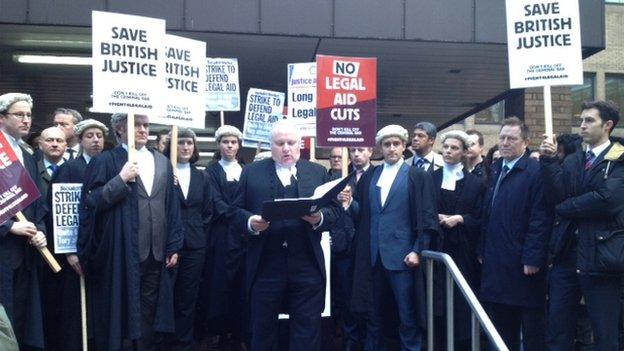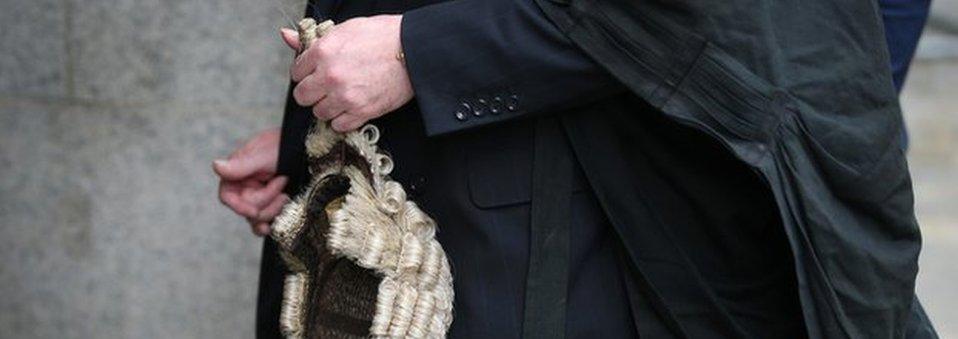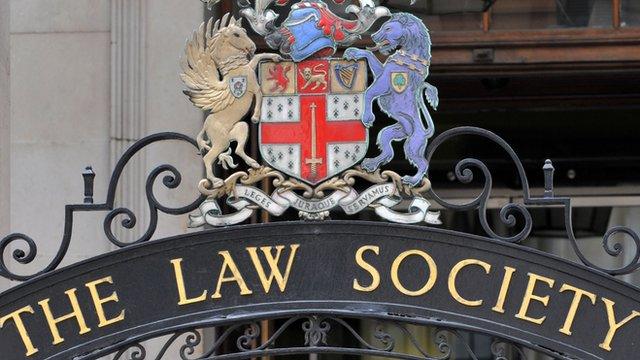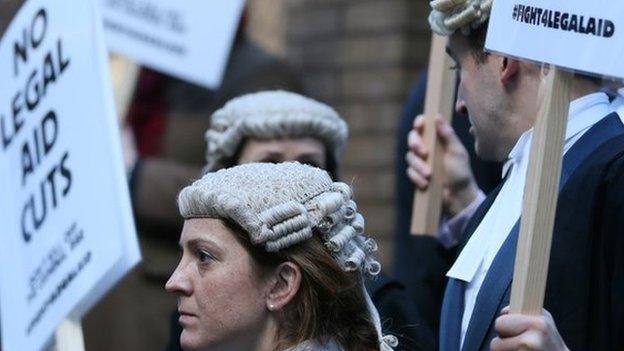Legal aid reforms scrapped by Michael Gove
- Published

Lawyers had protested and gone on strike in response to the planned cuts
A major reform of the legal aid system in England and Wales has been scrapped, the justice secretary has announced.
Plans to slash the number of law firms allowed to do criminal legal aid work at police stations and magistrates' courts have been dropped, while an 8.75% cut to legal aid fees lawyers earn has been suspended for a year.
Michael Gove said the MoJ had faced too many legal challenges over the plans.
Lawyers had claimed the reforms could damage quality and access to justice.
Labour shadow justice secretary Lord Falconer said the government's plans had "descended into utter chaos".
The proposed cuts - drawn up by former Justice Secretary Chris Grayling - would have reduced the number of solicitor's firms awarded "duty contracts" by about two-thirds from 1,600 to 527.
Firms awarded the contract are placed on a rota, and called on to represent people who qualify for legal aid at police stations and magistrates' courts.
However, the Ministry of Justice (MoJ) faced 99 separate legal challenges over the proposals, and there were "real problems" in pressing ahead, Mr Gove said in a written ministerial statement., external

Analysis

By BBC legal affairs correspondent Clive Coleman
"Duty" work at police stations and magistrates courts is prized because it provides solicitors with clients.
The reform was designed to consolidate the profession and achieve economies of scale by reducing the number of contracts from 1,600 to around 500. Firms took part in a detailed procurement process to win one.
Amidst controversy and allegations of ineptitude from a whistleblower, some succeeded, many failed, leading to 99 separate legal challenges.
Citing those, and a settlement from the Treasury that gives him more flexibility, Mr Gove says he doesn't want the legal aid market to face years of uncertainty and expensive litigation, so he's ditching the policy.
It's yet another U-turn on a policy of his predecessor Chris Grayling, following those on restricting books for prisoners, building a secure college for young offenders and scrapping of the contentious criminal courts charge.
Lawyers groups are delighted. Relations between Mr Gove and Mr Grayling? Probably icy.

Mr Gove said: "My decision is driven in part by the recognition that the litigation will be time-consuming and costly for all parties, whatever the outcome.
"I do not want my department and the legal aid market to face months if not years of continuing uncertainty, and expensive litigation, while it is heard."
'Doomed endeavour'
Under the proposed new system, a total of 527 legal aid "duty contracts" would have been split between 85 geographical areas, with between four and 17 contracts awarded in each area.
The Law Society had argued that "large areas of the country could be left without legal representation", and "the most vulnerable in our society will have inadequate access to legal representation".
Other law bodies warned some firms would be "considering their future" if they lost their legal aid contract, and that lawyers risked losing their jobs.
Although solicitors lost a legal challenge to the government's reforms in the High Court last year, Mr Gove acknowledged lawyers' fears, saying they "weighed heavily" on him.

How does criminal legal aid work?
Anyone who is arrested or interviewed under caution by the police is entitled to have free legal advice and representation.
Solicitors firms who win a "duty contract" from the Ministry of Justice are placed on a rota to provide that representation, for which they are paid legal aid fees.
If a case goes to the magistrates' court, a defendant must apply to the court for legal aid, known as "a representation order".
The application is tested to determine whether the case is serious enough to require full legal representation, and the defendant is means tested.
Among those eligible are people under 18, on income-support, or with a gross annual income of under £22,325 a year.

However, Lord Falconer said the MoJ had been told the policy "would be a disaster".
"This is a staggering admission from the Tory government and represents a final confirmation that their plans to reform criminal legal aid have descended into utter chaos," he said.
"The government must now come clean about how much public money has been wasted on this doomed endeavour, so that ministers can be held fully accountable for this fiasco."
Mark Fenhalls QC, of the Criminal Bar Association, said it had been the right decision to abandon the "flawed plans".
An MoJ spokesman said the UK's legal aid system was "still one of the most generous in the world", and spent £1.6bn on legal aid last year - almost a quarter of its departmental budget.
"The spending review settlement we have reached with the Treasury for the next five years leaves legal aid almost untouched," he said.
- Published25 March 2015

- Published18 February 2015

- Published23 January 2015

- Published4 June 2013
